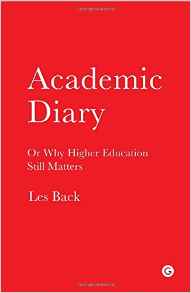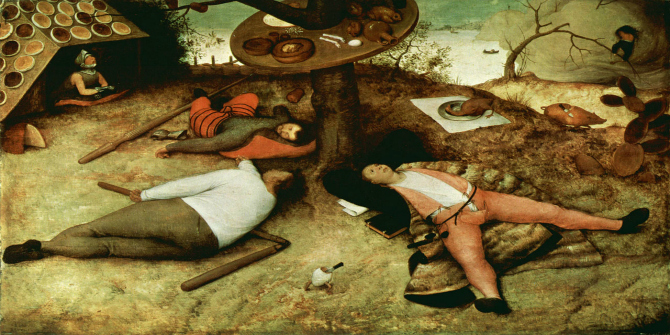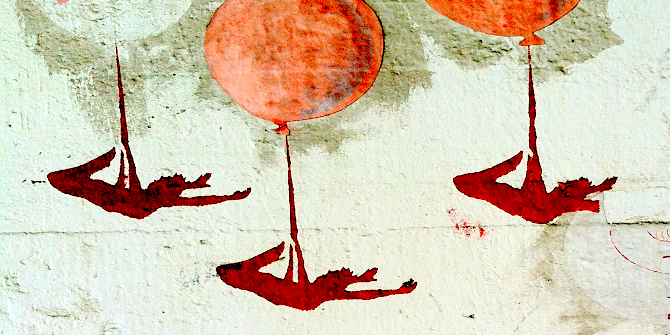Presenting a collection of diary-style entries as though from a single academic year, Les Back chronicles three decades of his career in Academic Diary: Or Why Higher Education Still Matters. The book offers witty and thought-provoking insight into such topics as writing, PhD supervision, viva examiners and dealing with academic colleagues, as well as reflecting on some of the serious challenges facing Higher Education today. Kate Bailey anticipates that this book will become a firm favourite that will be read, and re-read, for years to come.
Academic Diary: Or Why Higher Education Still Matters. Les Back. Goldsmiths Press. 2016.
 At a time when discussions about Higher Education seem to take place under a permanent dark cloud, Les Back’s Academic Diary: Or Why Higher Education Still Matters offers a rare moment of insight into some of the more uplifting, encouraging and thought-provoking facets of academia. It is an engaging read from cover to cover, written in such an open and warm style that I finished the book feeling as if I had sat conversing with Back himself.
At a time when discussions about Higher Education seem to take place under a permanent dark cloud, Les Back’s Academic Diary: Or Why Higher Education Still Matters offers a rare moment of insight into some of the more uplifting, encouraging and thought-provoking facets of academia. It is an engaging read from cover to cover, written in such an open and warm style that I finished the book feeling as if I had sat conversing with Back himself.
Split into three main sections identified by the different university terms (‘Autumn’, ‘Spring’ and ‘Summer’), Academic Diary presents itself in the somewhat unconventional style of ‘diary’ entries: each is marked with a date and much of what Back discusses relates to the time of the academic year when the entry was written. I enjoyed this format as it not only provided a sense of continuity between Back’s reflections and the pace of the academic year, but also meant that the book was very easy to dip in and out of. Back has written that he imagined readers engaging with Academic Diary when they found a spare moment in their day, whether this was over lunch or during a commute, and the book does lend itself well to this; each entry is short enough to make for a quick yet satisfying read.
Academic Diary does not contain footnotes despite the vast amount of literature that is engaged with, as Back believes that such a conventional form of referencing would counter the experiment of writing an academic book in a different style. However, in the back of the book, there is a list of all the resources that Back refers to, helpfully grouped under a number of themes such as ‘Intellectual life and its Purpose’ and ‘Campus Fictions’, allowing readers to chase any points of interest with greater ease.
Back covers a wide variety of topics within Academic Diary: the process of writing, anonymous reviewers, the use of Twitter, PhD supervision and dealing with academic colleagues, to name but a few. Although certain entries focus on one particular topic, readers will find that these thought processes are often re-engaged with in different sections, where they are then examined from a new angle. The difficulty of writing, for instance, is not only discussed in relation to the role of stationery, but also the space in which writing takes place. This continued and connected reflection that occurs throughout the book prevents Academic Diary from appearing as a series of disjointed and unrelated articles, instead linking together many of the discussions. Different entries will appeal to different people depending on their own experiences, but there is something within the book for every reader, whether they are an undergraduate student, a PhD student, an academic or even someone who is just curious about the academic world.
 Image Credit: (Magic Madzik CC 2.0)
Image Credit: (Magic Madzik CC 2.0)
Back’s entry in which he writes a letter to an undergraduate student who is just about to start her studies offers friendly but valuable advice about how she should handle the years ahead. For instance, he advises her to ‘listen but don’t be silent’, stressing the importance of being an active listener within lectures and seminars, but also an active participant. He reminds her that ‘there is no such thing as a foolish question’: a point that addresses a fear many students have upon entering University, that they will look foolish if they ask for clarification. As well as offering advice about the academic side of University, Back also emphasises the importance of exploring her own interests – getting involved with societies or the student union, for example – as these experiences can be life-defining and possibly the beginning of ‘something that will be important for the rest of your life’.
Although Back stresses that Academic Diary is not meant to be any sort of self-help book, as a third-year PhD student who is starting to feel that initial sense of dread about the upcoming viva, the entry in the ‘Summer’ section on just this topic also offered some very valuable suggestions that I will keep in mind. He takes time to walk the reader through how a viva tends to work, removing some of the frightening mystery around it. He likens it to a kind of ‘intellectual gambling’ in that you have to be clear of the intellectual cards you have in hand: what the value of your thesis is, what its main argument is, what others in the field will find interesting. Back reminds the reader that examiners want a ‘dialogue’ not a lecture, and that even though it can be a nerve-racking experience, the viva can also be enjoyable and intellectually stimulating. At the close of the entry, Back also lists the three types of personalities that he would avoid asking to examine a thesis: the intellectual narcissist; the time-ruthless academic superstar; and the discipline police. (I have underlined this section of the entry quite heavily.)
Other entries that I developed a particular fondness for when reading the book are those that discuss the role of libraries within Back’s and others’ lives, and the very short but delightful entry, ‘Extra Curricular’, in which a group of academics come to realise that they’re seated with much more interesting people than they first thought. It is little jewelled entries such as these that makes Academic Diary so engaging a book, as rather than ignore the humanity and the individuals within academia, Back does his best to draw them out and remind readers that they exist.
While Back’s writing is light and humorous and shares many anecdotes intended to raise a smile and a laugh (I especially enjoyed the story about invigilating in the Summer term), he also doesn’t shy away from discussing, and at times criticising, the more serious aspects of academia. This is arguably a somewhat turbulent time in the academic world with job security and opportunities difficult to find, cuts to university funding taking place and the constant challenge to justify a life of the mind all creating difficulties. Back confronts many of these problems and shares his own opinions on them, referring often to conversations he has had with other academics and students. He voices disapproval over topics like the increase in student fees and the impact this has had on students and their learning experiences; the poor treatment that international students face; and the seemingly continuous transformation of universities into businesses, both in practice and in mind. Readers may not agree with everything Back suggests or argues, but this is something I believe Back himself has predicted and would embrace. Academic Diary neither professes to have all the answers nor to be a definitive work on life in academia; what it does offer is a starting point from which discussions amongst all groups of people may develop.
Academic Diary was a truly enjoyable book and one that I would recommend to any reader interested in Higher Education. After reading various passages to different friends, a number of people are keen to get their hands on a copy to read the book entire (although I am reluctant to let my own copy wander too far!). While the style and pace of Back’s writing makes it very easy to become engrossed, I found that when reading the book I marked several passages that I wished to return to and contemplate further. Back offers so many insights and points of reflection within Academic Diary that it would be difficult to not come across something that makes you pause and think. I have no doubt that the book will become a firm favourite with many, and one that will be re-read time and time again.
Kate Bailey is a PhD student in the History Department at Lancaster University, UK. Her research is currently examining the memorialisation of the ‘disappeared’ in Guatemala, looking at the use of street art, art exhibitions, museums and public events as forms of alternative memorial. Follow her on Twitter here: @KH_Bailey. Read more reviews by Kate Bailey.
Note: This review gives the views of the author, and not the position of the LSE Review of Books blog, or of the London School of Economics.








2 Comments